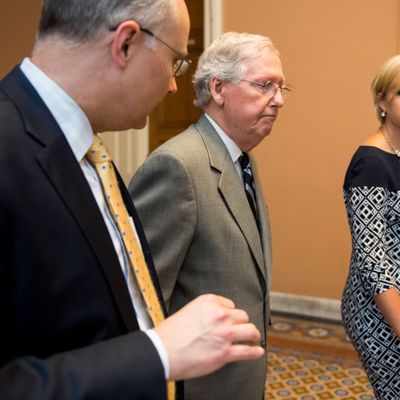
It appears that the saga of the Senate’s consideration of major health-care legislation is going to end as it began: in a deep fog of secrecy and uncertainty, with no clear outcome in sight.
Even as Senate GOP leaders insist they will press for votes next week, there is not, at present, any version of legislation to repeal and/or replace Obamacare that the requisite 50 Republican senators can support. That is most emphatically true of the two proposals currently on the table: the revised Better Care Reconciliation Act (itself a variation on the House-passed American Health Care Act) that Senators Lee and Moran torpedoed last weekend, and a revived “straight Obamacare repeal” plan modeled on the legislation the Senate approved and President Obama vetoed in 2015.
The two big questions at the moment are whether there is some hypothetical twist on BCRA that can pick up a few more votes without losing any of the bill’s previous supporters — and whether, with or without any such deal, McConnell can secure the 50 votes he needs to bring up the legislation for consideration in the first place. If that answer to the second question is no, then nothing else matters.
An announcement yesterday by the firmest-of-firm Republican opponents of BCRA, Rand Paul, that he would indeed vote for a motion to proceed if he is guaranteed a vote on a “straight repeal” plan, created a fresh glimmer of hope that McConnell can bring up health-care legislation even if the path to passage of any particular plan is unclear. Once the bill is on the floor, the Senate budget process requires a brief but uncontrolled period of wide-open amendments commonly called a “vote-a-rama.” Even as Republicans fight off mischievous Democratic amendments designed to put them on record as favoring or opposing various high-profile health-care policy propositions, they’ll have the opportunity to eventually coalesce — or so McConnell hopes, anyway — around some BCRA revision that will be offered as a substitute for the House bill the Senate will use as a starting point.
As to what such a revision might look like, it would almost have to closely resemble BCRA in its basic structure to keep conservatives onboard. That means maintaining a permanent cap on federal Medicaid expenditures, and including some version of the controversial Cruz amendment, which would allow insurers to offer cheaper and less comprehensive individual health-insurance plans. The Cruz amendment is designed to lower premiums for younger and healthier people, at the risk of much higher premiums for those with preexisting health conditions.
Getting Senate moderates to vote for a bill with a Medicaid per capita cap and the Cruz amendment is where the whole process has ground to a halt. But it seems the strategy is for McConnell to throw absolutely every nickel of funding at his disposal (somewhere in the neighborhood of $200 billion in “excess” deficit reduction, according to the latest Congressional Budget Office’s assessment of the revised BCRA) at the states to ease immediate coverage concerns caused by the rest of the bill.
But there is an existential threat to this scheme that could emerge as early as today, when the Senate parliamentarian informally lets senators know of her rulings as to whether various provisions of the pending bill (and various likely amendments) pass muster under budget rules requiring that all items are germane to federal spending and revenue levels. According to a handful of experts assembled by the Times, there is a decent chance the parliamentarian will deem the Cruz amendment unallowable. If so, that would leave McConnell with the unsavory choice of finding some way to regain conservative support for yet another revision of BCRA or, worse yet, overturning the parliamentarian’s ruling on the Senate floor. This latter contingency would, many fear, lead to a de facto abolition of the legislative filibuster, since a simple majority could at any time rule any provision germane to a budget bill, which cannot be filibustered.
So a lot is going on under the cloak of secrecy as we approach the climactic week. Still another variable is whether and when John McCain — diagnosed earlier this week with brain cancer — returns to the Senate. His absence means that it takes only two dissenting Republican senators to derail the critical motion-to-proceed necessary to get the ball rolling on health-care legislation.
All in all, the odds of legislation successfully emerging from this nightmarish tangle remain quite low, despite the insistence of the GOP leadership and the president that failure is not an option. The fundamental problem remains that just enough Republican senators either absolutely demand or greatly fear, a reversal of the movement toward universal health coverage that Obamacare represented and partially achieved. That is a conundrum that even Mitch McConnell’s role model, the Great Compromiser Henry Clay, would have struggled to resolve.






























